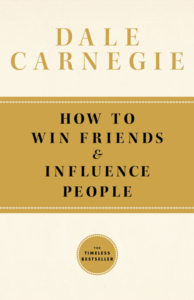Would you like to improve your relationship with your spouse or children?
Would you like to improve your experience with teachers, coaches, and administrators this coming year at school as you try to influence them and work with them for the benefit of your children?
Would you like to simply have a better time with the people in your community?
There are some books so full of practical wisdom about relationships that they deserve to be read every year or three. I want to recommend two such books to you. The first is How to Win Friends and Influence People by Dale Carnegie.

This book has been in print for eighty years. And not only that, it has been, year after year, one of the bestselling books out there for almost each of those eighty years. For example, Amazon right now ranks it the #9 most read book. You’ll see other books come and go on that list. But books like this and Stephen R. Covey’s The Seven Habits of Highly Successful People stay.
There are thousands of how-to books published each year on relationships in business and personal settings. Most are never seen again. But this one has stayed because people find it so useful they recommend it over and over again.
And I wish to heck I’d not waited ten years to pick my copy up again.
As I re-read the book this last month, I saw that if I’d been thinking about the practical guidelines Carnegie shares, I could have avoided a number of public and private arguments I’ve had over the last few years.
I could have avoided subjecting those relationships to attack, coming to my senses, and then trying to clean up the mess, large or small.
But even more important, I could have added a little more sweetness to my life and the life of others I encounter on my way. There are only so many days we have here on earth, and how much better it is to add additional drops of honey to them instead of vinegar.
One of the wonderful things about his book is that Carnegie shares the wisdom in a down-to-earth way with lots of examples and stories. He shares wisdom on building relationships, being liked, winning people to your way of thinking, and how to make your requests for change known without giving offense or rousing resentment. And he does it simply and in a way that you feel like you’re sitting down with a good-humored grandfather. There are no dry, abstract parts. Just look at a sampling of the chapter titles.
- “If You Want to Gather Honey, Don’t Kick Over the Beehive”
- “He Who Can Do This Has the Whole World with Him. He Who Cannot Walks a Lonely Way”
- “An Easy Way to Become a Good Conversationalist”
- “If You Must Find Fault, This Is the Way to Begin”
- “Give a Dog a Good Name”
I can tell you that every time I try to approach things the way he proposes, they almost always seem to go better.
If you have an issue you want to discuss with a school teacher, coach, or administrator this year, let me suggest you first listen to what Carnegie has to say. I can promise you you’ll get much farther. And you will probably end up enjoying the interaction.
If you want to improve your time with your wife and kids, open this book and look for insights.
If you want to have a better time with your co-workers or boss, I suggest reviewing the wisdom you’ll find here.
Carnegie doesn’t possess all the wisdom there is to be had about relationships. There are many people out there with great insights. But, gee whiz, he provides a great start. If you want to add some sweetness to your life, I think you’ll find this book a great help.
Let me illustrate this Carnegie stuff with an experience I had with one of our high school coaches two years ago. I have a vast background in basketball that includes, well, nothing. I basically know how to dribble a ball. Oh, yeah, I also played church ball two or three years in a row back in the 1980s. So, as you can see, my knowledge is vast.
And not to toot my own horn, but this wasn’t just any church ball team. This was a team that improved the sport.
How? You ask.
Well, during one of those church ball years, me and the guys from my ward (“congregation” for those not familiar with the Mormon faith) thought it would be capital to make jeans and concert tee-shirts our uniforms. Back in those days concert tee-shirts looked like this.

This meant we ran up and down the church courts with drugs, sex, and rock and roll on our chests (I’m sure that’s precisely what the brethren had in mind for the program).
As you can see, we were way up there on the basketball ladder.
So back to this coach. My daughter was playing on the high school team, and the team was having a consistently hard time with one type of defense. And I thought, “Self, there’s got to be a way to break that defense.” These are the big thoughts that basketball gurus like myself have.
And so I researched and watched and talked to folks who had actually played basketball competitively (unfortunately, without concert tee shirts) and identified an offensive counter that looked like it might work.
And I sent an email to the coach sharing my idea.
Now, the coach could have reacted in many ways. Especially given the fact that (1) he had already thought of the idea I was proposing, (2) had already tried it in games that, yes, I had attended, and (3) probably knew just a teensy bit more about basketball and his team than I did even though my church ball team had vastly superior uniforms.
But this coach, whether he knew it or not, was following a number of the principles found in Carnegie’s book, including the chapter titled “Let the Other Person Save Face”. This meant that instead of rolling his eyes or ridiculing or saying something like, “Brown, are you blind?”, he explained what he was doing and then expressed his appreciation. He was happy I was so invested. He thanked me.
And here’s the thing: he meant it.
I replied that if he ever wanted someone to suggest an idea he was already trying, to just call. I’d be happy to help.
We laughed, but the important thing is that what could have been a wedge became a good experience for all. And, more than ever, I wanted to work with him to help my daughter in the program.
I will give you one more example. There’s a mother who had four of her children go through my wife’s seventh and eighth grade language arts classes. Now, Nellie is a worker. She expects her students to work. She wants to have a good time, loves having great interactions with the kids, but she also wants them to improve and learn, and knows that’s going to take some work. Sometimes the assignments, despite her best efforts, aren’t clearly understood. Sometimes they’re a bit challenging. And this sometimes creates frustration.
There are a lot of ways that parents deal with this. But this one mother took an approach that, whether she knew it or not, followed many of the principles in the book including those shared in “You Can’t Win an Argument” and “A Formula That Will Work Wonders For You”. This resulted in a fabulous working relationship. It helped the mother have less stress. Helped her kids. And helped Nellie improve her program.
The issues the mother encountered could have become wedges, but instead, because of how she handled them, they became stepping stones. And this didn’t happen with this one individual. There are many mothers and fathers who have taken a similar approach with similar results. The principles work every time.
I could go on with many more examples in other situations, but why listen to mine? Carnegie has a book full of them. If you want to improve your relationships or persuade others to your way of thinking, you’ll want to start by reading this book.
The second book I want to recommend is I Don’t Have to Make Everything All Better by Gary and Joy Lundberg. But this post is full, so stay tuned, and next time I’ll explain what awaits you in its fabulous pages.















Just doing my periodic “John check”, and lo-and-behold, yet another gem.
This time, something that made me stop and rethink what I already [thought I ] knew.
Of course, everyone knows about this Carnegie book -but I’ve never actually read it. And I clearly and most passionately [key word for me] should have / need to.
I stick my foot in my mouth and spend so much more time and energy in removing it and cleaning up the collateral damage – i wonder how much more effective my life would be [have been] had i read this 10x by now. sigh.
Food for thought.
Of course, the way you write about this, the examples, your wordsmithing (is that a term?) -all superb, as always. Very entertaining, insightful, and -in this case- motivational. It always seems silly for me to tell someone of your caliper “Well Done!” -but its all i am left with.
Anyway, as I am 80 years late to this party, I think i’ll crawl into the corner with this good book and pretend i was there all the time 🙂
I cannot do much about the past but maybe some focused attention on the principals described in this book will make for a brighter future for me. Hope springs eternal.
PS – Along with completing [years ago] Covey’s 7 Habits course, i then picked up a copy of a 7 Habits daily devotional-of-sorts: I frequently [re]read it — so i am not a complete moron; just a partial one.
I hope you enjoy it. It’s a great book!